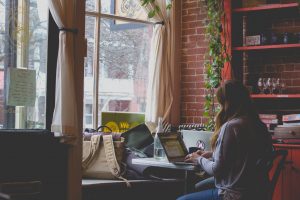As is the case for many of us, this past year has kept us at home, locked in to our living spaces which have now become at the same time, home, school and office. How can we make the best of it and still manage to succeed at our work and study while not being distracted by all the things around us? Your situation may differ depending on how comfortable or roomy your space is, but there are still things that you can do to make the best of it.
Have Your Own Work Space
If possible, have a designated space. If you live in a multi-room space, house or apartment, try to designate one room as your office/ study room. Even if it’s the living room, a spare room, small vestibule, or foyer, make sure that the people that live with you know that certain times during the day, you will need to use this space for work or study. If you don’t have a spare room because you live in a studio or one-room apartment, maybe take a corner of the bedroom, or the kitchen table, and only use that space for work during that time, symbolically making that a work space to contrast with the rest of your free time. To more clearly define your space, you might like using a paper screen or a curtain to more clearly mark off the space. This can serve two purposes, first, hiding from sight the rest of the house, thus eliminating visual distractions. Second, if you need to use video conferencing, it can also hide the rest of your house from the caller. It can make your video conferencing more professional-looking and also give you some privacy.
Block Out Noise
If you live with roommates or family, distractions can be auditory as well as visual. To eliminate noise distractions, try using headphones. Noise cancelling headphones can be especially helpful, even if you are not trying to listen to something. They can help block out distractions, allowing you to concentrate on your work. As stated above, get support from your family or roommates that this time is for your study and ask that interruptions be limited to very important circumstances. Even here where I work from home, we make sure to not interrupt the other as much as possible. Even if one of us has to walk through the room, we do so quickly and as quietly as possible. We also use headphones when we are working at the same time, to limit the amount of noise interruption for each other.
Prepare Your Space For Efficiency
If you are working or studying from home, then making that space more efficient is essential to your concentration. If you sit at a desk, or wherever it is that you choose to work, make that space efficient by having what you need at hand, writing utensils, paper, notebooks, textbooks, reference materials, a small desk lamp, even making sure to have a beverage or healthy snack nearby can help save precious minutes. The moment you get up to grab something can cost you an hour, just by getting distracted, thinking you need right now to do the laundry or wash dishes or check messages on your phone.

In addition to having a good space conducive to work, make sure you have a comfortable chair or place to sit and do your work with ample lighting. These things can make all the difference. A good chair will prevent back pain, leg pain and overall make your work more comfortable. Proper lighting will help you stay alert and awake. If the lighting is too dim, staring at the computer screen will hurt your eyes, and you will start to feel too tired to concentrate.
Dress for Work or School
Remembering that you are going to school or work, even though you are in actuality just sitting down in front of the computer in your home, is important to your attitude about it. So my advice is to dress the part. Put on a good shirt or top, even if the bottom is a comfortable pair of sweatpants. Even something as simple as putting on “outside” clothes can change your attitude. You can even change your clothes at the end of the day or when your studying is done, to symbolize that the day is done and you can now relax and play.
Get Organized
Another way to keep you on track is to outline your projects for the day. Making sure you know what absolutely has to be done today, what your deadlines are, and what can wait for later is key to staying on task. I keep an agenda open on my desk, with all my courses listed for the week. I can easily see what courses are coming up and whether I need to prepare something for them. I put a check next to each one when I have done my preparation for them. I also have a column down the side of the page where I note some additional projects that I need to remember to do. 
Set Alarms
It could also be helpful to set an alarm to warn you about the passing of time. I used to find it very useful to have an alarm going off 30 minutes before my lessons, so that I don’t get carried away with an activity and miss my class. Alarms can be set to remind you of the end of a break, so that you don’t go too long, warn you about upcoming meetings, the end of lunch time, or for project deadlines. Speaking of breaks, make sure that you do in fact take a break. It is very important for your brain, for your motivation, even for your creativity that you have a reasonable amount of time for a rest. There is only so much information your brain can absorb in a matter of time. Therefore, it is preferable to stop, have a snack, take a rest, do something enjoyable, go outside and take a walk. Just be sure to set that alarm to let you know when that break is over.
Hide the Cellphone
However, a word of warning about using cell phone for alarms, silence it for all other alerts. I recommend turning off push notifications. They can be distracting and keep people from concentrating on work. They encourage users to pick up the phone and look at alerts, read articles, and then they get lured into reading mail and other messages. Before you realize it, an hour has passed while you are supposed to be studying or working. It is better to put the phone on a “do not disturb” setting, or even airplane mode. It is true that this could prevent your phone from ringing, causing you to miss important calls, but there may be a way to have a “breakthrough” message or call from certain selected numbers in your contact list. That will probably depend on the phone. I also suggest hiding the phone in a drawer or out of site while you are trying to work or study.
Keep Your Goals In Mind
Finally, I understand that for most people this situation is not ideal. Some workers miss the office camaraderie, interacting with colleagues; students must miss the classroom experience, seeing friends and socializing in between classes. It is essential that people remind themselves of why they are doing this. If you are a student, you must have a goal. Maybe you are studying to improve your life, build skills for your professional life, for a better job, college entrance, or for international travel one day. All of these are really great reasons to continue your study despite the government orders to close schools to on-site courses. Keep your goals in mind as this is going on. It will keep you motivated. For professionals working from home, remember the above tips and make sure to balance your work and private life. Make that distinction clear. Close the door to the office at the end of the day, change your clothes, and turn off the computer. There are a lot of ways our work can bleed into our home life when working from home. Keeping the balance is important.
